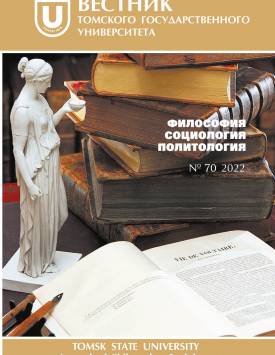Correlation of the concepts “spontaneous” and “unconscious” in the social sphere
In Russian philosophical reflection, the concepts “spontaneous” and “unconscious” in social processes are often identified, which leads to two undesirable consequences. Firstly, such an interpretation leads to an expansive interpretation of the spontaneous, as a result of which the definition denotes a class of heterogeneous phenomena. Secondly, the identification of the spontaneous and the unconscious leads to the ignoring of the concept of the social unconscious in Russian science. Explication of the spontaneous and the conscious as opposites logically means their definition through the dichotomous properties inherent in the oppositional side. Being more complex, the correlation of the spontaneous and the conscious is not reduced to their elementary opposition. Although spontaneity does not exclude some constants of the conscious, their presence is not enough to avoid disorganization, disorder of the course of social processes. The lack of a sufficient degree of awareness of the social subject undoubtedly leads to spontaneity. However, this fact does not mean that the concept “consciousness” is opposed to the concept “spontaneity” in the categorical sense. Such an opposition means mixing categorical analysis with empirical statements. It seems appropriate to define spontaneous as a form of social activity characterized by an insufficient level of planning, organization, and control over the course of activities. It is these properties that are the criterion for distinguishing between spontaneous and non-spontaneous, in contrast to the traditional pair of categories “spontaneous” and “conscious”. In the author’s opinion, it is legitimate to define the spontaneous through the opposition of organization, the conscious through the opposition of the unconscious. The following point indicates the logic of such a comparison of concepts. The conscious and the unconscious represent the spiritual sphere of being, organization and spontaneity include both the ideal beginning and the material and practical one. It follows from this that “conscious” and “spontaneous” are diverse concepts, as a result of which they are not conjugate categories. Thus, the distinction between the concepts “spontaneous” and “unconscious” not only helps to clarify their relationship with the related categories “organized” and “conscious”, but also has heuristic significance, indicating the grounds for distinguishing the concept of the social unconscious as a separate subject of research. The author declares no conflicts of interests.
Keywords
conscious, unconscious, spontaneous, organizedAuthors
| Name | Organization | |
| Barmashova Tatiana I. | Krasnoyarsk State Agrarian University | tatibar910@mail.ru |
References

Correlation of the concepts “spontaneous” and “unconscious” in the social sphere | Tomsk State University Journal of Philosophy, Sociology and Political Science. 2022. № 70. DOI: 10.17223/1998863X/70/15
